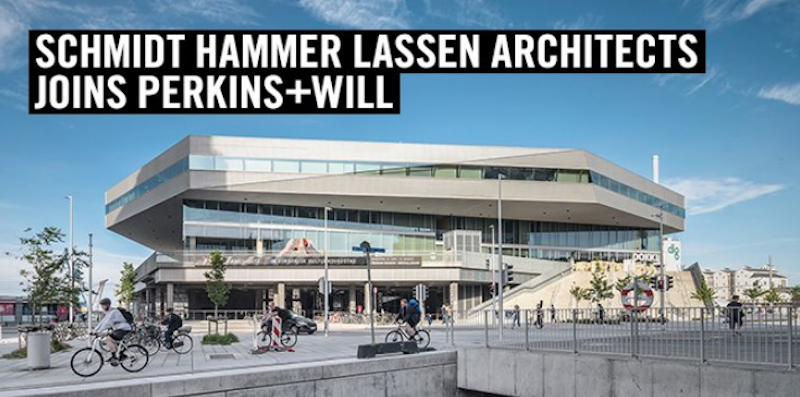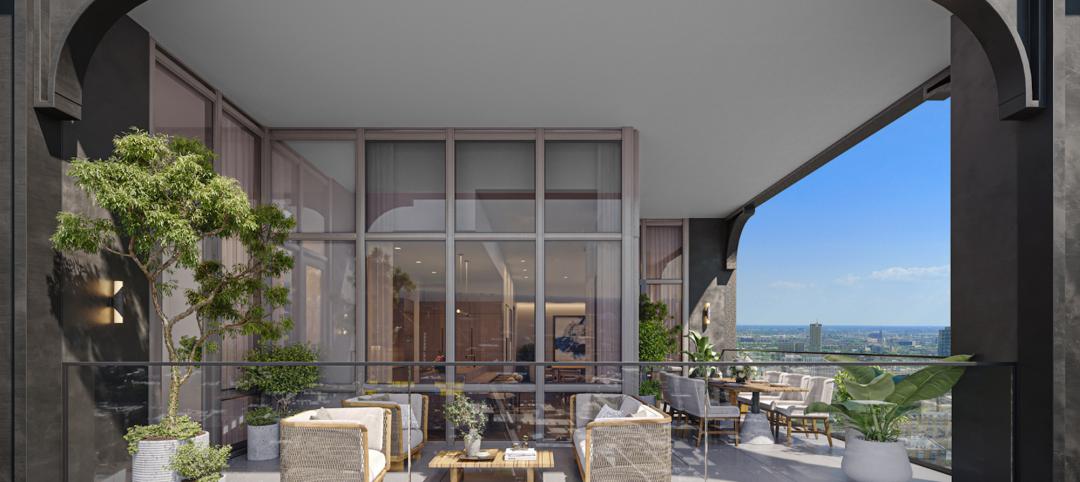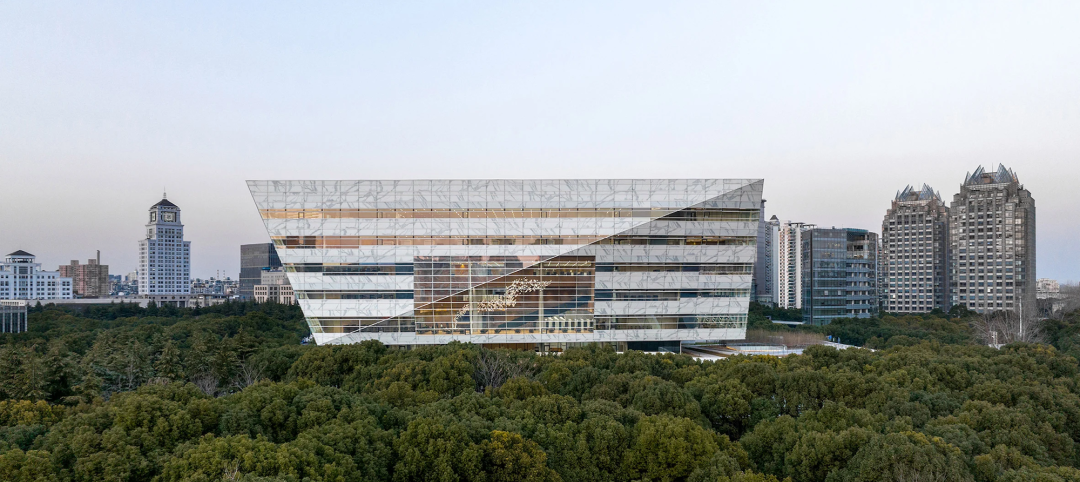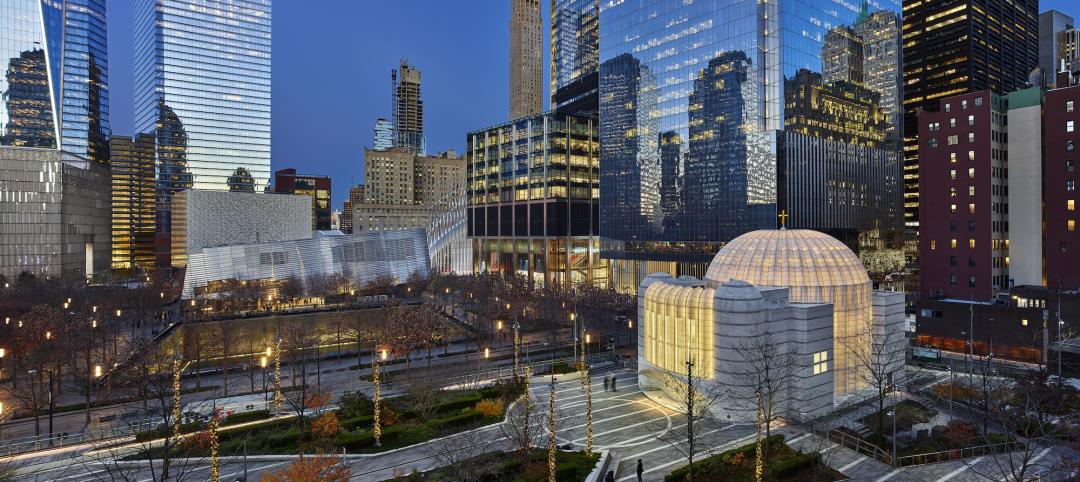One of Scandinavia’s most recognized design firms, Schmidt Hammer Lassen Architects, has joined global architecture firm Perkins+Will in a strategic partnership that extends Schmidt Hammer Lassen’s international reach and reinforces Perkins+Will’s commitment to sustainability and design excellence.
Founded in 1986, Schmidt Hammer Lassen is known around the world for its iconic, highly sustainable cultural and civic architecture, including The Black Diamond, the extension to the Royal Library in Copenhagen; ARoS Museum of Art in Aarhus, Denmark’s second-largest city; Halifax Central Library in Nova Scotia, Canada; the Katuaq Cultural Centre in Nuuk, Greenland; and the International Criminal Court in The Hague. The firm recently won a global competition to design the world’s largest library—the 1.2 million-square-foot Shanghai East Library—and it is currently working on the transformative Monroe Blocks mixed-use development in Detroit, Michigan, the firm’s first project in the United States.
By combining Perkins+Will’s 83-year legacy of design excellence with Schmidt Hammer Lassen’s illustrious Danish design pedigree, the united firms will make even greater contributions to the canon of cultural and civic architecture, according to Perkins+Will CEO Phil Harrison.
“Part of what makes this partnership so special is that Perkins+Will and Schmidt Hammer Lassen share a common set of values: design excellence, sustainability, innovation, and the highest level of client service,” Harrison says. “We also maintain the same design ethos, believing that exceptional architecture is always democratic and in the service of the greater good. We’re compatible at every level.”
Bjarne Hammer, founding partner of Schmidt Hammer Lassen, agrees:
“Our firms share a clear mission: through architecture and design, we make a positive difference in the world and in the lives of others. We both believe strongly in the transformative, healing power of design to address some of the most pressing social and environmental issues of our time. And, we both thrive in a design culture that encourages collaboration.”
Complementary Goals
In addition to a shared vision and purpose, the two firms have symbiotic market strategies. Perkins+Will aims to diversify its global talent, expand its cultural and civic practice, and reinforce the caliber of its design portfolio. At the same time, Schmidt Hammer Lassen aims to expand into new geographic markets, grow its client base, and apply groundbreaking design research to practice.
“We want to be known as a company that is both design-driven and client-focused, as a firm that produces extraordinary designs and delivers them with extraordinary efficiency. Merging with Perkins+Will enables us to maintain this critical part of our identity while having the support, technology, and reach of a much larger organization,” says Schmidt Hammer Lassen CEO Bente Damgaard. “It’s a fantastic opportunity.”
Perkins+Will’s global platform also provides a host of benefits to Schmidt Hammer Lassen’s international clients, Damgaard says, because they now have all of the resources, talent, and expertise—including research—they need within a single firm. This streamlines collaboration, facilitates communication, and ensures smooth project delivery.
Aligned In Design
The union of Perkins+Will and Schmidt Hammer Lassen is supported in large part by both firms’ legacies of, and commitments to, design excellence.
Over the last eight decades, Perkins+Will’s landmark projects of beautiful, thoughtful design—like the transformative Rush University Medical Center in Chicago, Illinois; the Shanghai Natural History Museum in China; and the Albion Library in Toronto, Canada—have characterized the essence of the firm. Similarly, Schmidt Hammer Lassen’s portfolio of award-winning architecture—projects that constitute works of public art in and of themselves—underscores the firm’s 32-year history of distinguished design. Examples of built work include Dokk1, the largest public library in Scandinavia; Malmö Live, a concert, congress, and hotel complex in Sweden; and Vendsyssel Theatre in Denmark, a music and theater hall that celebrates cultural exchange.
“Our firm is unequivocally rooted in Scandinavian architectural traditions, which are based on values like democracy, welfare, sustainability, light, openness, and social responsibility,” says Kristian Lars Ahlmark, senior partner at Schmidt Hammer Lassen. “Our buildings not only reflect these values, but they also impart these values on all who encounter them, whether tenants, visitors, or passersby.”
Synergies in Sustainability
Additionally, both Schmidt Hammer Lassen and Perkins+Will are known leaders in sustainability. Through their high-performing, environmentally responsive designs, the firms contribute significantly to the reduction of greenhouse gas emissions that cause climate change, and to the improvement of human and ecological health. The firms have designed hundreds of projects—collectively amounting to several hundred million square feet—that meet or surpass various international standards for green building. And their staff include many of the industry’s most sought-after experts in sustainable design.
“Sustainability is in our DNA at both Perkins+Will and Schmidt Hammer Lassen,” says Damgaard. “It’s just another example of the synergy between our firms—and of why this partnership makes sense.”
Cultural Diversity
The partnership is also a celebration of differences in culture, customs, language, and heritage—and of the design innovation that occurs when those differences interplay.
“Both of our firms believe in the global diversification of talent and creativity,” says Harrison. “We see the coming together of design cultures, aesthetics, and sensibilities as a positive force that leads to better, more thoughtful, more inclusive architecture. At Perkins+Will, we appreciate and celebrate Schmidt Hammer Lassen’s Danish design legacy, and look forward to the many ways it will positively influence our collective body of work.”
Related Stories
AEC Tech | Jan 19, 2023
Data-informed design, with Josh Fritz of LEO A DALY
Joshua Fritz, Leo A Daly's first Data Scientist, discusses how information analysis can improve building project outcomes.
Multifamily Housing | Jan 19, 2023
Chicago multifamily high-rise inspired by industrial infrastructure and L tracks
The recently unveiled design of The Row Fulton Market, a new Chicago high-rise residential building, draws inspiration from industrial infrastructure and L tracks in the historic Fulton Market District neighborhood. The 43-story, 300-unit rental property is in the city’s former meatpacking district, and its glass-and-steel façade reflects the arched support beams of the L tracks.
Urban Planning | Jan 18, 2023
David Adjaye unveils master plan for Cleveland’s Cuyahoga Riverfront
Real estate developer Bedrock and the city of Cleveland recently unveiled a comprehensive Cuyahoga Riverfront master plan that will transform the riverfront. The 15-to-20-year vision will redevelop Tower City Center, and prioritize accessibility, equity, sustainability, and resilience.
Museums | Jan 18, 2023
Building memory: Why interpretive centers matter in an era of social change
The last few years have borne witness to some of the most rapid cultural shifts in our nation’s long history. If the experience has taught us anything, it is that we must find a way to keep our history in view, while also putting it in perspective.
ProConnect Events | Jan 17, 2023
3 ProConnect Single Family events for Home Builders and Product Manufacturers set for 2023
SGC Horizon, parent company of ProBuilder, will present 3 ProConnect Single Family Events this year. At ProConnect Single Family, Home Builders meet in confidential 20-minute sessions with Building Product Manufacturers to discuss upcoming projects, learn about new products, and discover practical solutions to technical problems.
University Buildings | Jan 17, 2023
Texas Christian University breaks ground on medical school for Dallas-Fort Worth region
Texas Christian University (TCU) has broken ground on the Anne Burnett Marion School of Medicine, which aims to help meet the expanding medical needs of the growing Dallas-Fort Worth region.
Green | Jan 17, 2023
Top 10 U.S. states for green building in 2022
The U.S. Green Building Council (USGBC) released its annual ranking of U.S. states leading the way on green building, with Massachusetts topping the list. The USGBC ranking is based on LEED-certified gross square footage per capita over the past year.
Libraries | Jan 13, 2023
One of the world’s largest new libraries opens in Shanghai
Designed by Schmidt Hammer Lassen Architects, Shanghai Library East covers more than 1.2 million sf, 80% of it dedicated to community activity.
Religious Facilities | Jan 9, 2023
Santiago Calatrava-designed St. Nicholas Greek Orthodox Church opens in New York
In December, New York saw the reopening of the new St. Nicholas Greek Orthodox Church and National Shrine—the only religious structure destroyed on 9/11. Renowned architect and engineer Santiago Calatrava designed St. Nicholas Church to address the traditional Greek Orthodox liturgy while honoring the Church’s connection with the World Trade Center Memorial site.
Government Buildings | Jan 9, 2023
Blackstone, Starwood among real estate giants urging President Biden to repurpose unused federal office space for housing
The Real Estate Roundtable, a group including major real estate firms such as Brookfield Properties, Blackstone, Empire State Realty Trust, Starwood Capital, as well as multiple major banks and CRE professional organizations, recently sent a letter to President Joe Biden on the implications of remote work within the federal government.

















